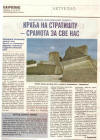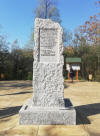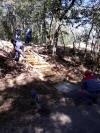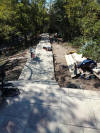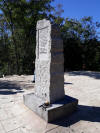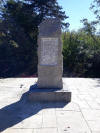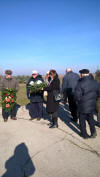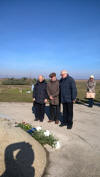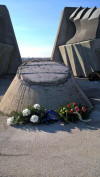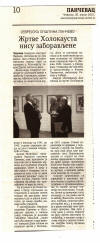The representatives of the Jewish community
of Pančevo - David Montias,
Mira Kon Panić, Ruth Lichtenthal and Darko Derikarava - visited the
renovated monument in Deliblatska peščara.
On this site on October 9, 1941, 430 Jews, prisoners of the Banjica
Concentration Camp, were executed. In June 1944, the remains of victims
were burned to destroy the traces of this crime.
In 1955, the monument was erected by the
Federation of Association of Veterans of the National Liberation War
from Kovin.
Reconstruction of memorials in Deliblatska peščara and Jabuka
After many years of appeals which the
Jewish community of Pančevo referred to the state institutions and
media, the state funds are finally provided for the reconstruction of
the monument
Čardak in the Deliblatska Peščara and
for the memorial complex Stratište near Jabuka village. Other
contributing factors were screening the film about places of suffering
produced by JCP, and the joint efforts with the Cultural Monument
Protection Institute to protect the places of suffering on the territory
of the Southern Banat. The reconstruction of memorial in Deliblatska
Peščara was completed in March 2018, while the works on reconstruction
the memorial in Jabuka, worth 14 million dinars, are in progress.
David Montijas, president of the JCP
January 27 - International Holocaust Day
The Delegation of the Jewish Community of Pančevo, the Pančevo
Anti-Fascist Union and the Pančevo Fighters Union laid a wreath on the
Memorial Stratište, near the
city of Pančevo, on the occasion of the International Holocaust Day. The
speakers recalled the crimes committed by the Nazi
when more than 6.000.000 Jews were killed, and spoke about terrible
suffering placed at Stratište in autumn 1941 where
most of the Banat Jews perished, even more than 92%.
The
tribune on the occasion of the liberation of Pančevo
At the invitation of the
Association of antifascists Pančevo and his president Miladin
Stanimirović, representatives of the Jewish community of Pančevo, David
Montijas, Miroslav Kon Panić and Biljana Weil, took part at the
"Resistance to Fascism" tribune. The panel was held in the City Library
in Pančevo on October 6, 2017, on the occasion of marking the 73rd
anniversary of the liberation of Pančevo in the WWII. The speakers were
the president of the Association of antifascists of Novi Sad Stanko
Šušnjar, historian Srđan Božović (National Museum of Pančevo), historian
Milan Micić (Novi Sad) and conservator historian Slobodanka Perovič
(Institute for the Protection of Cultural Monuments Pančevo).
The Association of antifascists of Novi Sad is engaged in national
liberation war in the period from 1941 to 1945. For several years now,
they are organizers of conferences on this topic, primarily concentrated
on Vojvodina, in which, as pointed out, the only resistance movement was
the Partisan movement. The first meeting of the Association was held in
2016 and was dedicated to the 1941 war year. This year's gathering was
dedicated to the year 1942.
The book "1941 u Vojvodini OTPOR FAŠIZMU" was presented at the tribune.
It is a collection of research papers on the events and circumstances in
which the people in Srem, Banat and Bačka found themselves at the
beginning of the war.
Commemoration in Pančevo - August 15, 2017.
The Jewish community of Pančevo marked the day of arrest of
Jews from Pančevo and surroundings by laying a wreath at the memorial
plaque, placed on the wall of the former concentration camp Svilara. On
that occasion the article by Dr. Teodor Kovač, referring to the
suffering and killing of Jews from Pančevo and Banat, was read.
On the night between August 14 and August 15, 1941, nearly
4000 Jews from Banat were arrested, and after a few days they were
transported to the concentration camps in Belgrade. Men, from the age of
14, were sent to the Topovske
šupe
concentration
camp, and killed by the end of October at the spot near Pančevo,
known as Jabuka killing site.
The
arrested women and children were accommodated in the houses of Belgrade
′s Jews up to their transferring to the Staro Sajmište
concentration
camp in
December 1941. Until May 1942 all of them were killed, i.e. gassed in a
special van, nicknamed
Dušegupka (soul
killer).
An excerpt
from the text of Dr. Teodor
Kovač "Banat Germans and Jews", Zbornik 9, Jewish Historical Museum,
2009.
In
Pancevo Aleksandar Hacker was shot on April 22, while Jakob Cadik was
hanged, Jene Weiss, a teacher, was killed in Kovacica, Dr. Hinko Has in
Alibunar.
The
deads came to see native Germans, including pregnant women and women
with children, at the graveyard, they were doing genuine orgies, ripped
hair from dead bodies, put cigarettes in their mouths and cylinders on
their heads.
What
were the perceptions of the Germans herecan be seen from the statement
of Dr Simon Bartman, attorney, on October 30, 1944: "On the day of the
entry of the German army into Banat, I was called by the new Mayor,
Christoph Hild, who told me that I could not take part in payed jobs,
because I was a freelancer. He also told me that a captain of the German
army had told them, probably the commander of the place, that the
Germans in Pancevo had the opportunity to earn and be rewarded. "
This
happened on the first day of occupation, which proves that the personal
enrichment of the Germans in Pancevo, headed by its Mayor, was at the
first place.
In
Vršac the main word in the abuses was given by prominent members of
Kulturbund Kurt Kirchner and Eder Gerhard.
They
were also cruel towards the Serbs, they chanted them in various ways,
and in the White Church, for some time, the Serbs were forbidden to walk
the sidewalk, and the Germans there looked at them as if they were some
lower beings.
It was
not harmless for the Jews to go along the street, because already small
children, indoctrinated by anti-Semitism, were spitting and cursing
them.
Thus,
Dr. Lila Stejic was attacked , shouting at her "dirty Jewish sow".
If the
Jews accidentally went wrong and walked through the sidewalk, and not on
the driveway, they were beaten up by their German fellow citizens, as it
happened in Vrsac and Bela Crkva.
Earlier friendly relations were no obstacle for domestic Germans not
only to avoid every encounter with the Jews, but to file complaints
against them.
And the smallest reason was enough to act, for example, for a
slightly longer use of time, when they were allowed to move around the
city for the purpose of shopping, was a trigger for applications.
It
happened very frequently that the German population fell into the
apartments of the Jews for the robbery, not only in Pančevo, but also in
other places of southern Banat, Vršac, Bela Crkva, Alibunar.
They
were particularly hateful when the Jews were going for forced labor when
they were saying "it's good, good, just force for work with those
bastards".
Jewish
cemeteries were demolished, gravestone monuments destroyed, tombstones
broken, the cemetery in Pančevo turned into a mortuary.
In
order to establish a whorehouse in Pancevo, intended for the army, they
were ordered to personally pass through the city, in the middle of a
day, within a few hours, all that was needed for the "institution", so
that the Jews transferred laurels, buckets, irrigators,ottomans,
pillows, mirrors, etc., while they were mocked by the Germans .
Unlike
the proceedings in Belgrade and in the interior of Serbia, where the
Jews were immediately after the entry of the Germans arrested
individually and in a relatively small number, arrests in Banat were
higher, in Pancevo during the first days twenty people were arrested.
Walthy,
seen person were first to be arrested.
After
being scandalized and humiliated, they were released and arrested again.
The
rabbi was forced to pray in Hebrew while cleaning and washing the cars,
all the time being beaten.
Afterwards, they particularly arrested persons against whom there was
some kind of delivery by the members of
the
Kulturbund.
The arrests happened
everyday.
The
suspects were detained in a former silk factory, hence the prison is
called "Svilara".
During
the day forced labor they were humiliated and abused.
In
addition, the regular phenomenon was swearing, spitting, blasphemy.
There
were no exceptions to slapping and pimping.
They
were forcibly used, especially the intellectuals, traders, rabbis, to
clean their toilets and contaminated rooms with bare hands (the
signatory of these pages had to clean the toilets in another Banat
place) to wash the windows, rooms, corridors with their robes and
clothes, and even with the beards.
They
hooked them in cars and coaches instead of horses and forced them with
the whip to transport timber and other things to some Germans or German
institutions in the city, or to do so in the courtyard of the prison.
They
forced them to cut the wood with completely blunt saw,
then beat them for "laziness," and so on.
The
rabbis were forbidden to hold worships, the synagogues were turned into
prisons or warehouses.
In the
evening, the guards in the prison often organized various "events" to
which the members of Kulturbund
had free access and, their wives and children.
The
main points of the "program" were carried out by Jewish prisoners.
The
events began with various antisemitic songs, in which they were
threatened with persecution, beatings, slaughter, while glorifying the
German people and his heroism.
After
the songs, there were other "fun" points.
The
elderly Jews had to go on all fours, to climb over the heads, to rid one
another, and so on.
One of
the favorite points was the "Duet Dajch-Darchas" duo, according to the
names of the performers, two prominent Jews from Pancevo: it was
performed in such a way that these two had to move on the floor of the
hall with quadruple fast movements, and Darchas occasionally had to
crawl and stretch under the belly of his partner, which was very hard,
so they often fell down and rolled over each other.
In
that case, the "director," Franz Keller, the infamous Jolie, commanded a
"break", which consisted in the fact that Darchas had to sit on the
belly of his partner.
"The
events" ended with a "game" in which German guards also took part.
Josif
Daich, a shipowner from Pancevo, but also other Jews were ordered to
take off the clothes and dance waltz, regiment and fokstrot with the
guards who stepped the legs of the Jews with their heavy boots full of
nails, so the legs of Jews were stained with blood, in the middle of the
hall, in the presence of soldiers and domestic Germans.
This
point caused the great joy of the present, because the victims were
bending, grunting and yelled out of severe pains.
Dr.
Ernest Darvas, a lawyer from Pancevo, exhausted and burdened had to sing
the rude songs...
...In
all Jewish shops, companies, factories, almost exclusively Germans were
placed as
commissioners. Using the opportunities available to them, in a short
time they became rich by the robbery of goods and money, found in the
appropriated houses.
For
example, in Pancevo, in the Fleissig electrotechnical shop, the
commissioner was Lenz, and in the Daich leather shop the commissioner
was also the German, Bruno Rudolf, both former
employees
in those shops; after
a few months, they opened new shops, filled with goods, robbed from
Fleissig or the Daich shop.
The
same case was with Oskar Fischgrund, where in the shop and on his
property was appointed as a commissioner Franz Wild, the bookkeeper of
that store, the German from Pancevo, and on the property of Ludwig
Jaraus and Michael Reiser, the Germans from nearby Kraljevićevo.
Always
abused, in uncertainty, encouraged, or, on the contrary, afraid of
various rumors of the future that awaited them, they lived all the time
from today to tomorrow, until the deportation.
In the
South Banat Counties Pančevo, Vršac, Bela Crkva, Kovin, Kovačica,
Alibunar, only 9% of Jews survived.
Commemoration in Kikinda - August 14, 2017
On
the occasion of the seventy-sixth anniversary, the delegation of the
Jewish Community of Pančevo attended the commemoration of the Jewish
victims, and laid a wreath at the monument of innocent victims. At
first, in 1941, Jews from Kikinda had been arrested and sent to the camp
in Novi Bečej, and then they were transported to Belgrade concentration
camps Topovske
Šupe and Staro
sajmište. Over 90% of Jews from Banat were killed or otherwise ended
their lives caused by the consequences of disease, hunger, exhaustion.
After the Holocaust, the Jewish community of Kikinda almost no longer
existed.
Jewish Community of Pančevo, on Tuesday, 2 February, 2016, hosted a group of 66 students and 6 teachers from Coutances (France). The visit was part of a ten-day program, which includes a trip through Central and Eastern Europe, with a goal for participants to visit the most important places of Jews and Roma execution during World War II. Guests from France, together with 20 students and teachers from Užice, first visited the Memorial "Stratište" near the village of Jabuka. Later, in the Great Hall of the municipality of Pančevo, Milan Jakšić, director of the Historical Archives, gave a lecture about the crimes against Jews and Roma in the village of Jabuka. As a courtesy of Touristic organization of Pančevo, guests from Užice and France organized visit to the National Museum with expert guidance of the curator. At the end the guests visited the camp "Svilara" where Montijas David, president of JC Pančevo explained events that occurred at the site during the Second World War.
More info
http://rtvpancevo.rs/Vesti/Lokal/gimnazijalci-iz-francuske-posetili-stratiste.html
http://www.rtv.rs/sr_ci/vojvodina/pancevo/mladi-francuzi-obisli-stratiste_685489.html
International
Holocaust Remembrance Day
The members of the Jewish Community of Pančevo, on
27 January, 2016, International Holocaust
Remembrance Day, laid a wreath at the monument "furrows" on the place
known as Scaffold. On the same day, attended the memorial service, which
was organized at the state level at the monument within the former
concentration camp Staro Sajmište and laid a wreath at the memorial
Topovske šupe.
Yom Hashoah Commemoration, April 2015
On the occasion of Yom Hashoa, the Jewish Community, in cooperation with Historical Archive in Pančevo, organized the exhibition “One day has 52 lives” by Gabriela Nikolić. In several exposed large format graphics, the artist wanted to revive a memory on the fifty two members of her family, killed in a single day in 1942, and to commemorate millions of innocent Holocaust victims.
The opening of the exhibition on April 16th was attended by the Canadian Ambassador in Serbia H.E. Philip Pinnington and Mrs. Pinnington, the members of the Community and many citizens. The exhibition was opened by Milan Jakšić, director of the Historical Archive.
On the same day, at the site of the mass execution of Jews in 1941, known as Stratište, located on the road between Pančevo and Jabuka village, a Kadish service and wreath-lying ceremony were held by delegation of the Jewish Community Pančevo at the monument, erected in 1986. Today, the monument is so devastated and there is no markings left on it. On the basis of a Nazi report, it is assumed that more than 10,000 Serbs, Jews and Roma were killed at the Jabuka execution site.
International Holocaust Rememberance Day, January 2015
Jewish
Community of Pancevo marked January 27, the Day of Remembrance for the
Victims of the Holocaust, laying a wreath at the tomb of Alexander Haker
at Jewish cemetery in Pancevo. Alexander Haker was the first Jewish
victim died at the beginning of World War II, on April 22, 1941. He was
killed in an independent police action together with other citizens of
Pancevo. David Montijas and Miroslava Kon Panic, the president and vice
president, in a brief speech reminded the present members of the
Community about outbreaking of anti-Semitsm. The tragic events that
followed led to the almost total destruction of the Jews of Banat,
already as soon as the autumn of 1941.
International Day Against Fascism and Antisemitism, November 2014
Desecrated
Memorial at Jabuka execution site
http://rtvpancevo.rs/Vesti/Lokal/stratiste-ponovo-oskrnavljeno.html
http://rtvpancevo.rs/Vesti/Lokal/skandal-ukraden-jo-jedan-deo-stratita.html
http://rtvpancevo.rs/Vesti/Lokal/formiran-tim-za-stratiste.html
